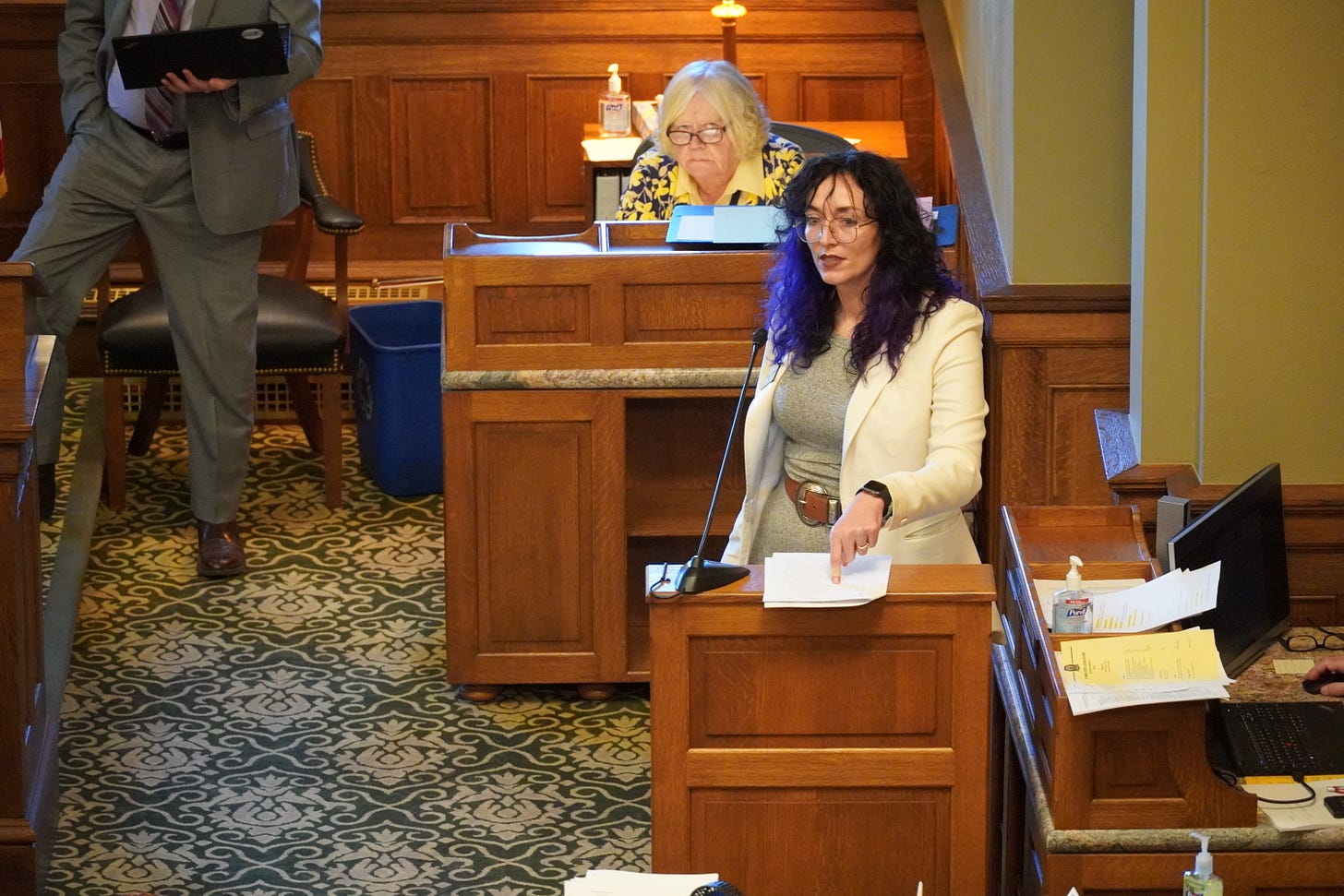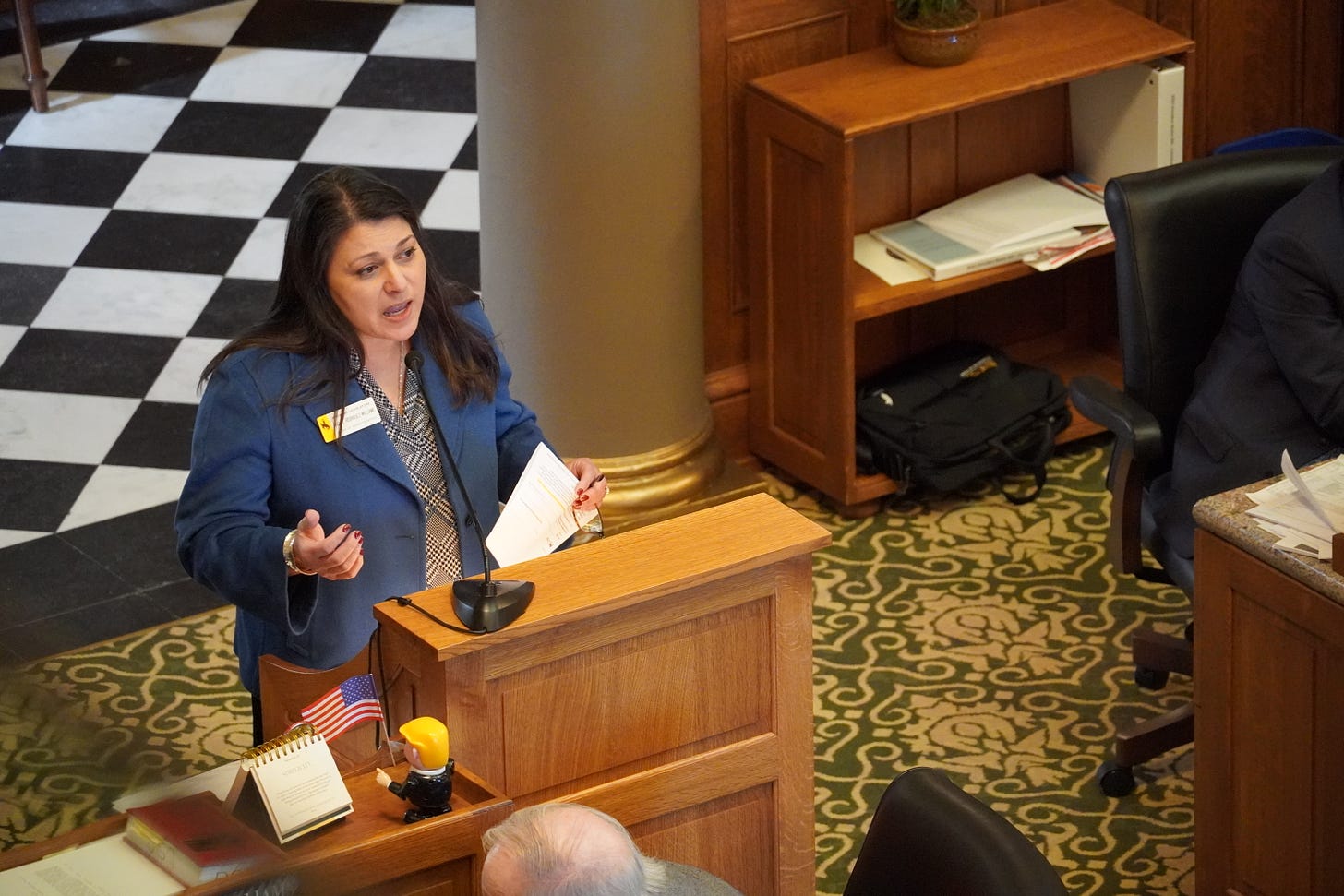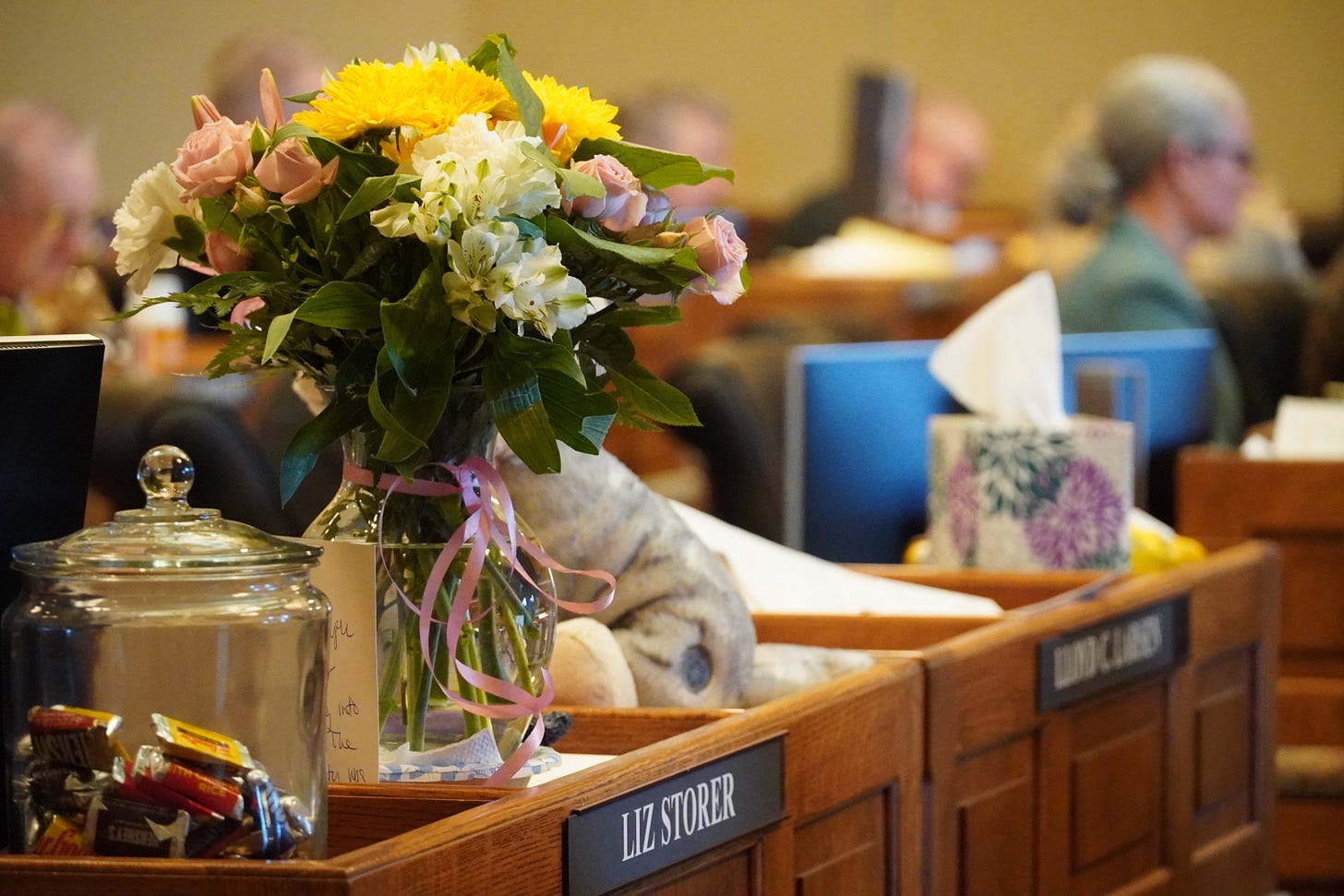Laramie Democrats oppose “poisoned” affordable housing bill
Once supportive of SF40, Democratic reps fought the inclusion of a Freedom Caucus-backed amendment they said “destroyed” the bill. They tried and failed to resurrect other dead housing proposals.

As they rocket toward an historic number of anti-trans bills, a major expansion of private school vouchers, and intense property tax reductions, state lawmakers won’t accomplish much this session when it comes to affordable housing.
The Wyoming Legislature let five of the six affordable housing bills filed this year die without discussion. The final bill was first watered down, then expanded to include a new provision that Rep. Trey Sherwood (HD-14) said “poisoned” the bill.
Senate File 40, which passed out of the Wyoming House Tuesday on a 51-9 vote, would make it a little harder for neighbors to halt a housing development going in next door.
But a late-stage amendment — championed by Gillette Rep. John Bear (HD-31) and other members of the state’s right-wing Freedom Caucus — made a significant addition to SF40. That addition forbids cities and towns from imposing “a monetary fee, non-monetary condition or other concession on residential or commercial development related to the provision of workforce housing, unmet housing needs or affordable housing.”
Sherwood said the bill now hinders affordable housing efforts rather than helping them.
“That amendment … essentially restricted a local government’s ability to leverage a fee or any kind of incentive for housing needs, affordable housing, workforce housing,” Sherwood said. “That made it such that I didn’t want to support the bill. So if that amendment had been taken off and really repealed, I would have been all in.”
The House debated the inclusion of the amendment for about an hour during the bill’s “committee of the whole” reading. The legislation’s second and third readings in the House were similarly tense, inspiring lengthy debates about the inclusion of yet more amendments.

Having passed in both the Senate and the House, the bill returned to its chamber of origin, the Senate, for a “concurrence” vote. But senators did not immediately agree to the additions made by the House.
“The process wasn’t followed,” Sen. Tara Nethercott (R-Cheyenne) said of Bear’s amendment. She urged members of her chamber to “stand together” in resisting the “serious irregularity.”
The senate did just that, voting 30-1 against concurrence. The bill must now be vetted by a conference committee of both House members and senators, who will be tasked with hammering out the differences between the chambers’ versions.
Once they agree to a unified bill, it can be sent to the governor for his signature.
A recent statewide housing assessment found that Wyoming will need between 20,000-38,000 new homes by the end of the decade if it’s going to reverse its existing shortage. A follow-up report outlines several recommendations for both local and state leaders, which include passing many of the bills filed and then dropped this session.
Housing advocates have said they’ll try again next year.
A matter of germaneness
Democrats first challenged the “germaneness” of Bear’s amendment, arguing the new provision not only violated the spirit of the original bill but expanded the legislation beyond its stated purpose, potentially violating the rules the House must follow.
The Rules Committee huddled to discuss whether the amendment was germane to the bill, ultimately voting it was. But Laramie Rep. Karlee Provenza (HD-45), who was presiding over the chamber that day, overruled the committee’s vote.
Members of the chamber challenged Provenza’s decision and the debate was immediately heated.
“Madam Chairman, what was the vote?” asked Natrona County Rep. Bill Allemand (HD-58).
“Doesn’t matter,” Provenza replied. “I am the chair, and I’m ruling that it is not germane.”
Freedom Caucus Chair Rep. Rachel Rodriguez-Williams (HD-50) later shared that the vote was 7-2.

Bear and his allies pointed to the bill’s title, which notes that it is “an act relating to cities and towns.”
“Cities and towns — that’s what the subject is,” Bear said. “We’re well within that.”
Laramie Rep. Ken Chestek (HD-13) said that was a ridiculous interpretation of the rules.
“Every bill that comes before us, every one, the title begins with ‘an act relating to’ something, something broad,” he said. “It’s some very wide open topic. If we say that anything relating to that broad topic is now germane, the whole germaneness argument is pointless, because everything is germane in a very broad way.”
The chamber ultimately voted to overrule Provenza’s overruling, thereby declaring the amendment “germane.” This opened the door for discussion on the amendment itself.
A matter of merit
Debating the addition on its merits, several lawmakers argued the amendment flew in the face of the bill’s original intent.
“Your municipalities, your cities, they want this bill,” said Cheyenne Rep. Lee Filer (HD-44). “Not this amendment.”
Jackson Rep. Mike Yin (HD-16) ran down the bill’s journey through the legislature, noting that its chamber of origin, the Senate, made tweaks — including amendments that both strengthened and weakened the bill.
“Great bill, love the bill, I want it to pass through, I want to make it so people can develop,” Yin said, praising the protest petition language that’s been the core of the proposal from the start. “Then we come to the committee, the Appropriations Committee … They hear one angry person that came from my neck of the woods that says they’re angry about the fairgrounds.”
Teton County imposes a fee on developments likely to increase housing demand; the fee is meant to counter that impact by supporting workforce housing.
Yin said the complaints the committee heard “literally had nothing to do” with the bill as written, but “suddenly” an amendment appeasing this one testifier was on the table.
“Everyone else who has testified — literally everyone who has testified, developers, towns, businesses — they all said, pass the bill,” Yin relayed. “When it came to work[ing] the bill … there was an amendment that the good Chairman [Bear] brought to the committee, and it was just adopted wholesale. No one had the language before the meeting from the public. There was no debate in the public of what the amendment had. It was just adopted.”
The amendment, Yin said, should be rejected as an inappropriate addition at an inappropriate time, given that it “has had no debate in the public sphere, none.”
“And we’re in the second house, so it will get no debate in the public sphere as written,” he said.
But Bear stuck to his guns, saying local governments need to be reined in. Teton County’s affordable housing fee was an example of government overregulation, he said.
“We are taking from property owners and saying, ‘We have a problem in our community, and you’re going to help us fix it, because you want to do something with your property,’” Bear said. “So folks, let’s just pass the amendment and get on with the bill.”
The amendment was added, with 31 members voting in favor and 21 voting against.
For Sherwood, who spoke with the Reporter after the bill’s third reading, the amendment is “really a direct attack” on Teton County and Jackson, but it’s “broad enough” that it could impact Laramie and every other community in the state.
In addition to banning fees, it also bans offering incentives.
“If the city of Laramie’s like, ‘Hey, we want to incentivize affordable housing or workforce housing or unmet housing needs, and we want to do that by waiving a permit fee,’ for example. That’s not charging money, but it’s providing an incentive,” Sherwood said. “The amendment would say that’s no longer legal. So it limits how local government can partner with private developers to address the housing shortage.”
A matter of not going far enough
Back on the bill itself, Yin doubled down on his support for protest petition reform — the bill’s original intent. Protest petitions can be brought by adjacent property owners to halt a project going in next door.
Under current state law, it takes 20% of the adjacent property owners to lodge a protest. As originally written, the bill would have raised that requirement to 50%, but a Senate amendment pulled that requirement back down to 33%.
Also under current state law, the protest petition must be approved by three-fourths of “all the members of the [local] governing body.” The bill, as originally written, brought that requirement down to a simple majority of the governing body. The same Senate amendment brought that requirement back up to two-thirds.
The overall effect of this Senate amendment was to land on a middle point between the law as it stands and the bill as originally written. Essentially, it was watered down so that it is now a less radical departure from the status quo.
But Yin, and housing advocates, said the status quo should be entirely upended. He brought an amendment to repeal the state’s protest petition process altogether.
“The folks who testified in front of us [housing advocates], they wanted it repealed, they wanted it repealed altogether,” Yin said. “The task force as a whole thought repealing was too harsh in that we would never get it through both bodies if we did a full repeal. I disagreed, and so I bring before you a better solution than having the zoning protest process defined at all in state statute, which is just to not have that protest process.”
Notably, Yin said, concerned neighbors already have ample opportunity to oppose projects they’re concerned about — such as when that project goes before the local planning commission and local government body.
“Adding the protest petition process in was something done a long time ago to give folks another bite at the apple,” Yin said. “It’s stopping people exercising their private property rights.”
But Sheridan Rep. Ken Pendergraft (HD-29) said it was important to have “one more bite at the apple.”
“What this particular section of law does is allow people one last chance to resist a developer,” he said. “There’s two sides to every story, and this gives an opportunity for, frankly, for the little guy, to have just that much better chance.”
Yin’s amendment was defeated.
The bill passed its “committee of the whole” vote, teeing it up for two more readings on the House floor.
Abandoned buildings redux, last ditch TIF
Having failed to stop Bear’s amendment or to repeal the protest petition altogether, Democrats attempted their own major expansions of Senate File 40 during the bill’s subsequent readings.
On second reading, Sherwood introduced an amendment adding in the full text of another bill she has been trying to pass for years.
The bill, filed this year as HB66, provides a tax credit to property owners who clean up, demolish or renovate abandoned or nuisance buildings. The bill actually predates Sherwood’s tenure in the Wyoming Legislature, having been first introduced by former Albany County Sen. Dan Furphy.
Last year, the bill had majority support but failed introduction on the House floor where it needed a two-thirds vote to be introduced. Following comments from some Republicans — either misunderstanding or misrepresenting what the bill does — the House killed the abandoned buildings bill with a 38-23 vote.
This year, Sherwood filed the bill again. It was not considered for introduction.
Sherwood’s proposed amendment to SF40 would have inserted the language from that dead bill into the live one, aiming to make it state law alongside the bill’s other provisions.
“This amendment gives our cities and towns the tools to address unsafe and abandoned buildings,” Sherwood told the chamber. “It creates a property tax reduction as an incentive to bring nuisance buildings up to code.”
The amendment died without much debate.

Yin tried his own amendment doing something similar, inserting the text of a separate affordable housing bill that died earlier this session. The amendment inspired debate about tax increment financing — a complex financial tool desired by cities and towns, builders, housing experts and other housing advocates — but, like Sherwood’s amendment, it also died.
Speaking with the Reporter, Sherwood admitted these attempts to expand SF40 mirrored the expansions that both Sherwood and Yin had been fighting just the day before.
“If my amendment had miraculously passed, it would still be not germane, would still be unconstitutional,” the Laramie representative said. “We ran those to force the conversation … Does it make it right? Maybe not. Did we just double down on violating our own rules? Probably. So I’m not going to say that I’m better than anybody else in this regard, but I really wanted to have this conversation about the state getting involved in addressing our workforce shortage, [our] affordable housing shortage.”
Sherwood saw Bear’s amendment as “poisoning” the bill — “high-jacking” a piece of pro-housing legislation to transform it into one that restricts cities and towns from addressing local housing shortages. Provenza, Chestek, Yin and Sherwood tried to stop it, but failed.
Yet in defeat, Sherwood said she also saw an opportunity to resurrect some of the housing discussions that otherwise would not happen this session.
“It was a window,” she said. “It created a precedent that allowed a window for broadening the conversation.”




Of course the freedom caucus would complete flub up a bill meant to help their constituents. 🙄
Simplest way to make affordable house affordable again is to repeal all building codes
passed after 1999. That would make housing affordable again.
But if you want to keep your codes, wait till you add on, remodel, or build a house.
You will discover that those codes are very expensive.